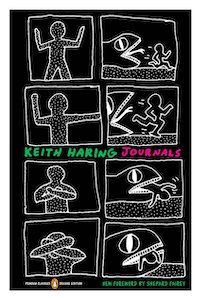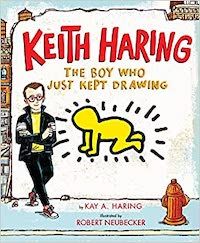If Keith Haring’s name doesn’t sound familiar, I’m still willing to bet you could recognize or have seen some of Haring’s work without knowing it. (Especially his figures dubbed the “radiant baby” and “barking dog.”) I don’t remember when or how I was first introduced to Haring’s art, but I have always liked that it is both refined and bizarre. The figurines in his drawings and paintings are evocative of the nonsensical drawings a child might produce with a pile of thick crayons and a sturdy imagination. Late in high school my fondness for Haring’s abstract imagery developed into a curiosity about the artist. I soon grew to feel connected to Haring and his queer identity, something that was important to me in high school when I was budding into my sexuality but absent the influence of any openly queer adults to admire. Since those school years I have collected a refrigerator magnet, a pair of shoes, and three T-shirts emblazoned with Haring’s artwork. They continue to be my favorite pieces to wear when intentionally celebrating my queer identity, like on National Coming Out Day or at Pride events. Mostly I love that each time I wear one of the shirts, inevitably a stranger will approach me to gush about their fondness for Haring. I have many reasons to admire Haring aside from simply enjoying his art: his work, at its core, was rooted in social justice. Haring was a vocal advocate for public and accessible art, underprivileged children, and the queer community. He volunteered his time and talent for public service agencies by producing murals or informational posters and provoked action with politically inciting works like the “Crack is Whack” mural in New York City and “Ignorance = Fear” poster. Perhaps the greatest gesture toward philanthropy made by Haring was his establishment of the Keith Haring Foundation in 1989, shortly before his death, to preserve his artwork and ensure the continuation of grants to not-for-profit groups. I am taking the opportunity of his would-be birthday to look more deeply into the life of this artist whose work I find so magnetic. From his own journal to a biography made for children, I have a handful of books about Keith Haring to dive into. The Keith Haring Foundation is an invaluable resource for learning about the man behind those vibrant drawings. The Foundation features a section, In His Own Words, that details Haring’s life from childhood to adulthood with quotes from the notebooks he kept. The Keith Haring Journals is another must-have for readers who want to be invited into Haring’s inner thoughts. Keith Haring: The Authorized Biography was published one year after Haring’s death and includes interview material from the artist and his closest friends. For a focus specifically on Haring’s advocacy for social justice throughout his career, check out The Political Line Book. Children are the target audience for a fair number of books about Haring. Keith Haring: The Boy Who Just Kept Drawing was written by Keith’s sister, Kay, and is essentially a biography made palatable for children. Nina’s Little Book of Things is a unique text created by Haring himself as a 7th birthday gift for a friend’s daughter. It’s since been reproduced to encourage the creativity of any child who can get their hands on a copy. Two just-for-fun book options are the Keith Haring Coloring Book and My First Coloring Book. You won’t glean any biographical material from these, but the opportunity to intimately interact with Haring’s art by coloring and marking them up yourself is not one you want to pass up.


